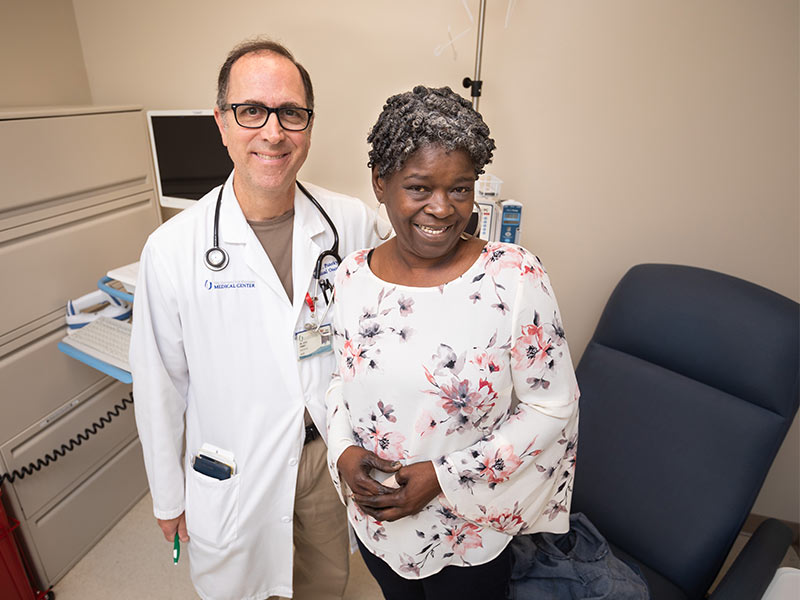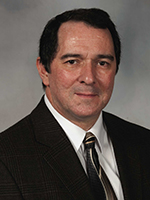Colorectal cancer experts embrace ACS call for earlier screening

University of Mississippi Medical Center doctors who treat colorectal cancer say they are encouraged by an American Cancer Society recommendation to start screening for the disease at a younger age.

In a “CA: A Cancer Journal for Clinicians” article published May 30, the ACS recommends people who are at average risk of colorectal cancer start screening at age 45 instead of age 50 and continue screening through age 75.“Over the past two years, I’ve seen an increase almost monthly of patients in this age range with colorectal cancer,” said Dr. Shannon Orr, assistant professor of surgery and head of the UMMC Cancer Institute’s Interdisciplinary Gastrointestinal Cancer Team. Catching and treating this cancer early improves survival.
According to the Mississippi Cancer Registry, in 2015, the latest year for which verified figures are available, of the 1,659 Mississippians diagnosed with colorectal cancer, 172 were age 49 or younger. In that year, 610 Mississippians died of it.
Caught earlier, patients “wouldn’t have to go through a major surgery and chemotherapy,” Orr said.
Linda Yassine of Jackson said her cancer proves that point. In 2007, at age 47, Yassine was diagnosed with metastatic colon cancer.
“If this had been in place, I would have had a colonoscopy at 45,” she said, explaining that her employer required employees to have recommended screenings to maintain lower costs on their health insurance.
Instead she sought medical help when she detected bleeding. Her diagnosis came on June 21 and she started radiation and chemotherapy on July 5. Later came surgery.
In 2014 her cancer recurred, went into remission and recurred again in 2016. Since her initial diagnosis she has moved from Michigan to Mississippi where treatment continues today with Dr. Louis Puneky, professor of medicine and medical oncologist on the GI team.
The ACS recommendation is based on new data that shows more men and women are being diagnosed with colorectal cancer at younger ages, said Letitia Thompson, vice president of cancer control for the ACS South Region.
Earlier screening means polyps that could lead to cancer can be removed or that cancer can be detected earlier.
“Those are lives that absolutely could be saved or we could improve the quality of their lives,” she said.
While the ACS recommendation carries weight, other groups, including the U.S. Preventive Services Task Force, still recommend those at average risk start screening at 50. Insurance providers usually base payments on the Task Force recommendations.
Most insurers pay for screening such as those offered for colorectal cancers.
“The ACS reached out to the Task Force and let them know ahead of time,” Thompson said. The Task Force typically reviews its recommendations on a rotating schedule. ACS recommendations are based on data that wasn’t available when the latest Task Force update occurred.
Thompson said the ACS wants to work with medical providers, insurance providers and the public to see the new guidelines implemented.

Dr. James Sones, director of UMMC’s Division of Digestive Diseases, said he thinks other organizations will follow the ACS lead in recommending screening start earlier. “It’s just a matter of time before this become the standard.”
Screening “costs less than paying for cancer therapy,” said Sones, a professor of medicine, whose work includes performing colonoscopies.
“The life from polyp to cancer is thought to be five to 10 years,” he said. “It’s a very slow process so it allows us to screen people and find them at a curable stage.”
Screening guidelines from the Task Force and other gastrointestinal organizations generally recommend:
- Screening for those at average risk start at age 50. The American College of Gastroenterology recommends African Americans start screening at 45.
- Screening for those who have a close family history of colorectal cancer start at age 40 or 10 years younger than the age at which the relative was diagnosed.
- Screening start earlier for those with hereditary colorectal cancer syndromes such as Familial Adenomatous Polyposis or hereditary non-polyposis colon cancer.
Screening tests include:
- A colonoscopy to identify if polyps are present and can be removed. If no polyps are found, this should be performed every 10 years.
- A flexible sigmoidoscopy, to detect polyps and cancer. If none are found, followups usually are recommended every five years
- A computed tomographic (CT) colonography, a digital colonoscopy. If polyps are found, doctors may recommend a colonoscopy to remove them. If none are found, followups usually are recommended every five years.
- A guaiac-based fecal occult blood test (FOBT) with high sensitivity for cancer. This is a stool test and should be performed annually. If blood or cancer are detected, doctors may recommend more followup tests.
- A fecal immunochemical test (FIT) with high sensitivity for cancer. This is a stool test performed annually. If blood or cancer are detected, more followup tests may be recommended.
- A stool DNA with high sensitivity for cancer. Patients should discuss intervals with their doctor.
Colonoscopies are the gold standard for detecting colorectal cancer, because polyps, if discovered can be removed before they become malignant. But other tests, including increasingly more sophisticated DNA tests, can detect cancer.
“We don’t want people thinking if I don’t get a colonoscopy, here’s nothing for me,” said Thompson.

Dr. Roy Duhe, UMMC professor of pharmacology and toxicology and a cancer educator, who leads the statewide 70x2020 Colorectal Cancer Screening Partnership called the recommendations exciting. “This will significantly reduce the number of deaths from colorectal cancer.”
The Partnership is working to see 70 percent of eligible Mississippians screened for colorectal cancer by 2020. Some 650 members throughout Mississippi are promoting multiple types of screening in hopes of lowering deaths from this cancer. The Centers for Disease Control estimates screening could prevent up to 60 percent of deaths from colorectal cancer.
For Yassine, the message is all too clear. Today she tells friends: “If you can go at 45, go; if you can go at 30, go. Cancer made so many changes in my life. Get screened.”

